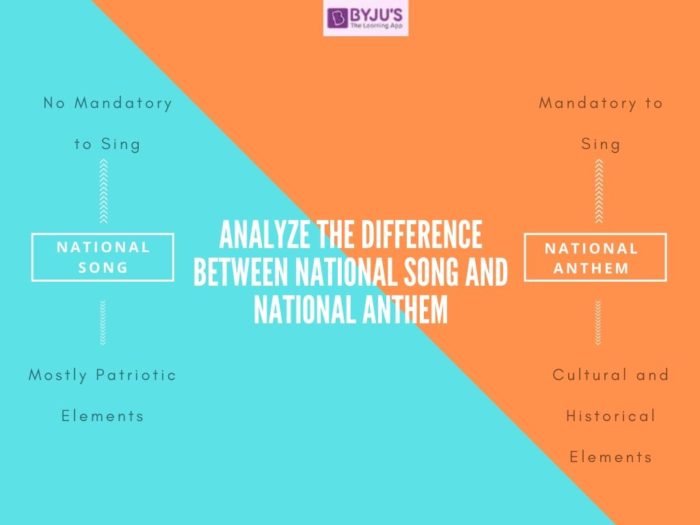The terms ‘National Anthem” and “National Song” are often used in the proverbial tandem with each other that the subtle differences between the two are often overlooked if not outrightly forgotten. UPSC CSE aspirants must refer to the details discussed further below.
A National Song is a patriotic hymn adopted by the government of a country to be sung on public or state occasions.
A National Anthem, on the other hand, is a musical composition, at times patriotic in nature, that defines a country’s history, tradition and struggles. It is recognized and adopted either by a nation’s government or by conventional use by the people.
Such differences are generally known by candidates but the facts about the same, which are important from the UPSC Exam perspective may not be known. Thus, aspirants must review the points of comparison discussed further below.

This article will further highlight the differences between a National Song and National Anthem within the context of the IAS Exam.
Differences between National Anthem and National Song
| National Anthem |
National Song |
| A National Anthem reflects the history and culture of the country. | A country’s population will strongly relate to a National Song due to many different factors. |
| A National Anthem will have a particular pronunciation, specific tune and specified timings which must be adhered to by those singing it. | A National Song will have different variations depending on language and other cultural factors. |
| The National Anthem of India is the “Jana Gana Mana” composed by Rabindranath Tagore in 1911. | The National Song is “Vande Mataram” composed by Bankim Chandra Chatterjee in the 1870s. |
| As per Article 51A of the Constitution of India, honouring the National anthem is one of the fundamental duties of a citizen of India. | The National Song does not have such constitutional privileges were honouring it is listed as a fundamental duty of a citizen of India. |
| The Parliament of India can and has exercised its right to make the singing of the National Anthem mandatory on select occasions. | The National Song is held in equal reverence to the national anthem, but it is not mandatory to sing it at any given occasion. |
| The custom of officially adopting patriotic hymns as national anthems became a trend during the 19th century. | At the time, National Songs that were widely known and sung by the majority population of a country were at times adopted as the National Anthem. An example of this is the “La Marseillaise”, written in 1792 by Claude Claude Joseph Rouget de Lisle. It was composed during the initial years of the French Revolution as a means to inspire the population. |
National Song and National Anthem are both covered under the Polity segment in line with the UPSC syllabus. Aspirants can refer to the following links to study this segment:
- Indian Polity Notes for UPSC
- Polity Syllabus and Strategy for UPSC
- Difference Between Democracy and Dictatorship
- Important books for UPSC Political Science Optionals
- Sources of Indian Constitution
- National Code of Conduct
- Interesting facts About the National Anthem ff India
- Interesting Facts about the National Song of India
- Difference between Written and Unwritten Constitution
- Difference between Fundamental Duties and Fundamental Rights
- National Symbols of India
Difference Between National Song and National Anthem – Download PDF Here
Candidates preparing for the upcoming IAS recruitment must refer to the UPSC topper list and get inspired and motivated with their success stories.
Frequently Asked Questions on Difference Between National Anthem and National Song
Q 1. Which is the National Song and National Anthem of India?
Q 2. When was the National Anthem written?
Become familiar with the general pattern of the IAS Exam by visiting the IAS Syllabus page. For more exam-related preparation materials, refer to the links given in the table below:
Related Links:
| NCERT Books Free Download | UPSC Exam Pattern | NCERT Notes for UPSC |
| Intangible Cultural Heritage | Indian Personalities | PIB Summary and Analysis |
| Biological Weathering | Safety Valve Theory | WPI Index |
Comments